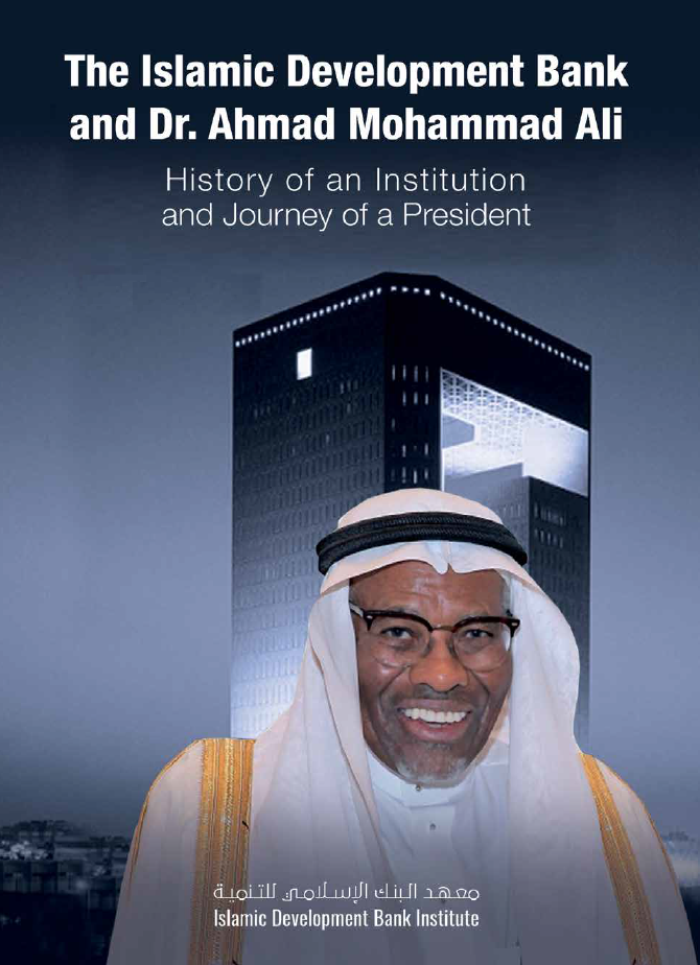The Islamic Development Bank Institute (IsDBI) has released a book which reviews the history and the exceptional achievements of the IsDB from a nascent idea till the retirement date of its first President, H.E. Dr. Ahmad Mohammad Ali, in 2016.
The book is the English language translation of the original book first published in Arabic in 2020.
It deals with the various stages and the main milestones the IsDB went through in the context of global and regional changes.
It also highlights the first IsDB President’s initiatives, approaches, and ideas that he drew on in his interaction with the realities of countries and communities whose aspirations for growth, progress, and prosperity are depicted in the essence of the Bank’s mission.
The book includes success stories that illustrate valuable lessons as well as testimonies of personalities who dealt with the Bank, believed in its mission, knew Dr. Ahmad Ali well and highly appreciated him.
The book was written at the behest of the former IsDB President, H.E. Dr. Bandar bin Mohammed Hamza Hajjar, in compliance with a decision of the Board of Executive Directors.
It deals with a bibliographical dimension containing nine chapters that discuss the in-depth analysis of information, details of the principles and professional fundamentals that characterize successful leadership, highlighting motivational and developmental factors, especially when addressing the challenges, obstacles and issues that impacted the Bank’s historic evolution and the initiatives taken to overcome them.
It also consists of Annexes that have seven sections detailing the sources of the book’s material and knowledge content.
In his comments on the release of the new book, Dr. Sami Al-Suwailem, Acting Director General of IsDB Institute and IsDB Group Chief Economist, said: “The book documents the Bank’s historical evolution and the impressive track record during the first 40 years of its activity under the leadership of H.E. Dr. Ahmad Mohammad Ali as well as reports his incredible journey and hard work. It provides information that had never been published before. We hope to benefit from this book and extend our gratitude and appreciation to H.E. Dr. Ali for generously devoting his time to the Bank’s advancement and contributing effectively to the development of the Muslim countries and communities.”
The book is written in a simple yet very structured style and is useful for diverse groups of readers, including researchers, development specialists, those interested in Islamic banking, and analysts of institutional and administrative practices and experiences.
The authors are two retired senior IsDB staff members –El Mansour Ben Feten and Dr. Marwan Seifeddine – who worked previously as advisors to the first president and department directors. They deployed the tireless effort and the diligence required in authoring a work of this nature by organizing the accurate information, carefully drafting sentences and phrases, and ensuring the meticulousness, and accuracy under the supervision of H.E. Dr. Ali and with the support and assistance of a team of IsDB Group officials.
“We wish to thank the IsDB Management for entrusting us with such a laudable assignment. As a result, we vowed to spare no efforts in writing a book that we hope will serve as a key reference work for IsDB staff, stakeholders in member countries, development partners, academic institutions and civil society organizations,” said the team of authors.
The book also covers an exclusive interview of Dr. Ali discussing the specific development issues of the IsDB in the early years and the current developments undertaken by the Bank, in addition to, the magnitude of the challenges and opportunities available in the foreseeable future in order to identify any shortcomings that Dr. Ali would have wished to internally enhance within IsDB, its member countries, and the globalized international environment.

COMMENTS